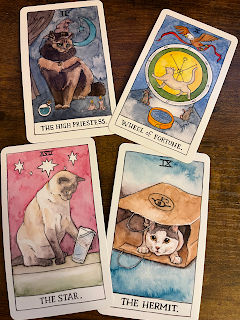Establishing Your Tarot Philosophy
Why Do You Want to Read Tarot Cards?
In other words - what kind of a reader do you want to be?
Let me elaborate. When you talk to different readers, you'll find they each have their own approach to reading the cards. In very simple terms, it's their Tarot philosophy. Some will tell you that they don't predict the future but instead use Tarot as a tool for discovery and insight. Others may use the cards to see into the (possible) future. Still others will have different approaches, all of which are valid.
It's important when starting out to determine your own philosophy. What is your reading goal. Another way to consider this is: What do you hope the querent will take away from your reading?
Don't be concerned if your Tarot philosophy changes over time; this is completely normal as you grow and develop your craft. In the past, I was more "future-oriented" and, while I still factor this concept into many of my readings, I encourage much more open-ended questions which generally provide more detail regarding a topic. Here's an example:
Initial question: Will I get married to X next year?
Revised question: What will be helpful for me to consider regarding this relationship and its potential?
Do you see how much more there is to explore in the revised question? This version opens the door for nuance and exploration.
What Questions Should I Answer?
Great question! So, that's largely up to you and your comfort level. I myself don't answer health- or law-related questions, as I don't have an MD or a JD and would never want to provide such advice. Some readers can and will do this, but many won't for obvious reasons (they'd prefer not to get sued). It's important to establish this right out of the gate when offering readings to avoid unnecessary frustration or disappointment.
Setting the expectations up front is much more likely to lead to a helpful and satisfying reading for both parties. You can create a talking point that you recite at the beginning of each reading, and/or post this on your website, collaterals, etc. I always mention that the intent of the reading is to be helpful and insightful but that everything is subject to change because all of us have free will.
To Tell or Not to Tell (the Question)
It can be helpful to know what information the querent is seeking in a reading, but it truly isn't necessary. Some querents won't want to tell you, and that's perfectly okay. I never demand they reveal their question, and usually the cards will give me some clues about the general nature of their concern so I can usually figure things out pretty quickly.
The advantage of knowing the question is that sometimes the reading becomes more satisfying and insightful for the querent when you conduct that reading with a focus. The challenge is that you need to be aware of your own beliefs as they will undoubtedly affect your interpretations. This is completely fine and expected, of course, but it's always important to check your biases before you proceed in any reading.
Here is part of my reading "preface" when I don't know the specific question:
I am going to tell you a story about your life, and it's going to be up to you to make sense of it. You are of course welcome to provide feedback and are encouraged to ask for clarification at any point in the reading; I'm happy to explain to the best of my ability. If you are not able to connect to the reading within the first 2 cards, please let me know and we can either try again or find another day and time for the reading just in case the timing is off for some reason.
My intention is to provide you an insightful and empowering reading, knowing that whatever the cards reveal that your future is up to you; we always have free will.
Any questions for me? Drop them in the comments. 💟



Comments
Post a Comment